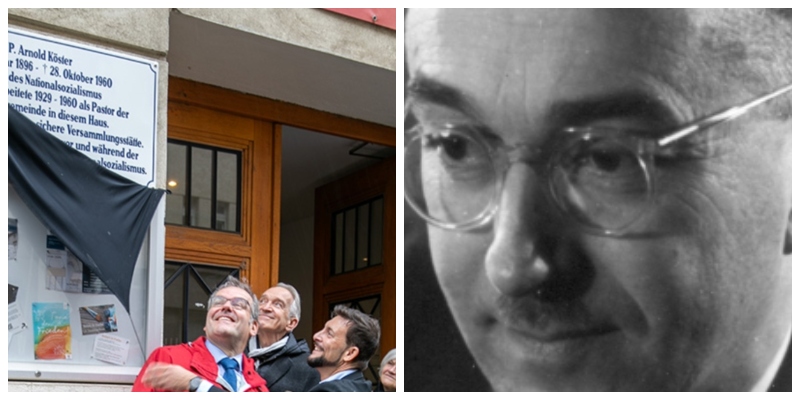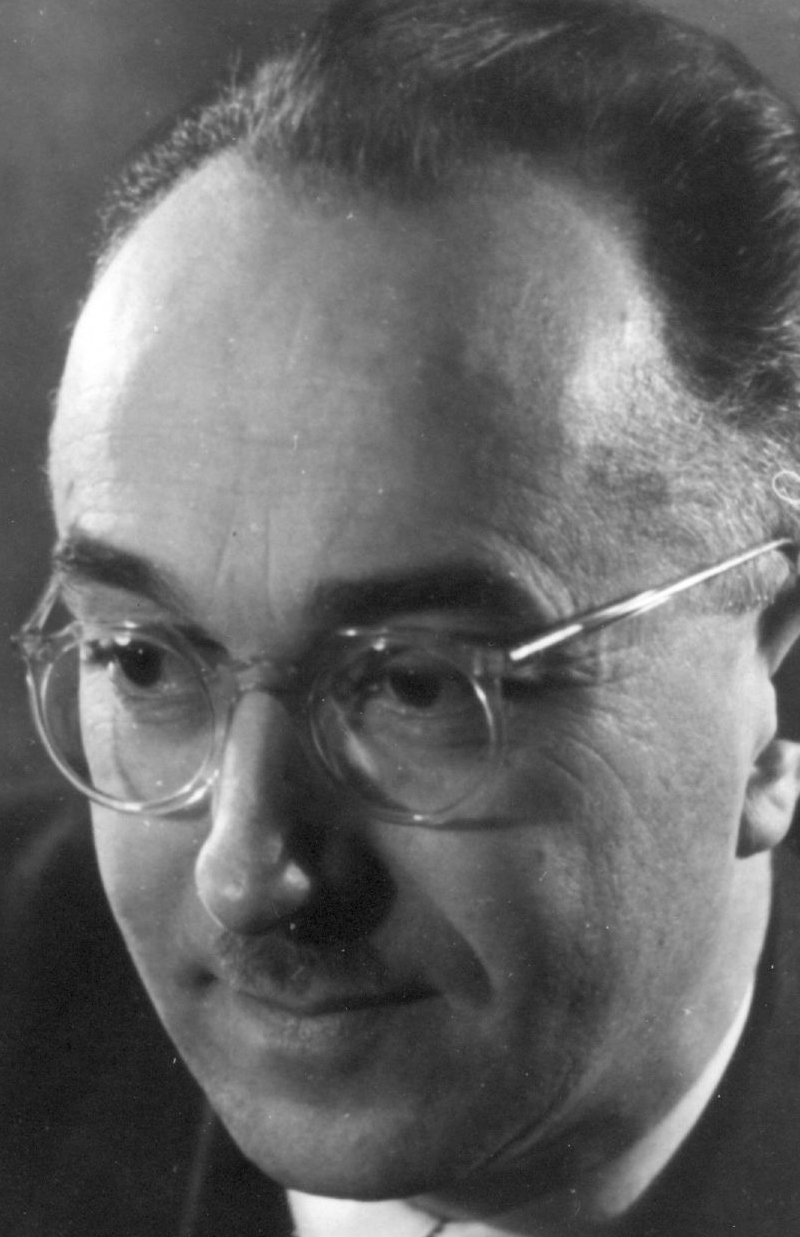Baptist pastor who stood against Nazi ideology honoured
A plaque commemorating Arnold Köster, one of the 'sharpest public, continuous critics of the Nazis in the Greater German Reich', has been unveiled as part of an Austrian church’s 100 year anniversary celebration

Arnold Köster was a German-born Baptist pastor and one of the most prominent Christian voices of resistance to National Socialism in the German-speaking world in the 1930s and 40s.
Köster was pastor of Mollardgasse Baptist Church in Vienna from 1929-1960, the only independent Baptist congregation in Austria at the time. His statements on National Socialism can be traced back to 1930 in articles in Baptist magazines and in around 500 sermons held during Austria's Nazi era.
Preaching twice on Sundays and delivering a lecture each Thursday, Köster has been described as 'one of the sharpest public, continuous critics of the Nazis in the Greater German Reich', by Franz Graf-Stuhlhofer, church historian and Baptist theologian. There were very few such critics in the free church environment, says Andrea Strübind, another Baptist theologian and historian.
Speaking out against the emphasis on racial differences, Köster also offered refuge to those persecuted.
Mollardgasse is one of Austria’s oldest Baptist churches, and recently marked 100 years in its current building.
As part of the celebrations the church had been approached by Vienna city council about putting up a plaque to honour Köster’s memory.
Ewan King, minister of Heath Street Baptist Church in London, participated in various activities surrounding the unveiling of a plaque.
He had been invited by Dietrich Fischer-Dörl (‘Didi’), the current pastor at Mollardgasse, as pre-pandemic the churches had stuck up an intercultural mission collaboration. Young Viennese Baptists have come over to London to help with the church’s Easter arts missions, while Heath Street members have been to Vienna to plan, to preach and to perform music. Ewan had also put Didi in touch with Paul Fiddes a few years ago, which resulted in Paul presenting a lecture there on Brahms and the Baptists.
The weekend of the celebrations and plaque unveiling saw constant torrential rain and high winds.
‘We unveiled the plaque in a blustery squall,’ Ewan said. ‘But there was coffee and cake, and excellent addresses from religious and civic leaders.
‘Definitely what left the deepest impression was a short address given by the Lutheran Bishop of Vienna, Michael Chalupka (see text below). He spoke about Lutheran complicity, Köster’s resistance, the failure of the church, and the faithfulness of God.
'But in highlighting the failure of the church, he also stated Protestantism still exists in Austria 'because of people (like Köster) who did preach the gospel in this time.'
Bishop Michael has a regular column in one of the big tabloids, the Kronen, and used it to write about Köster the next day, Ewan continued.
‘I think it’s fair to say that in German and Austria that dark period is generally on people’s minds more than usual, with the rise of the Far Right both there, and all across Europe.’
'Arnold Köster was able to preach here, and distance himself so clearly, and proclaim the gospel so clearly' - Bishop Michael Chalupka’s text
 Dear sisters and brothers, including the district councillor, your excellency and your magnificency, I would like to begin with a confession that has made me very thoughtful. Before I received the invitation to the unveiling of this memorial plaque, the name of Pastor Köster said nothing to me whatsoever.
Dear sisters and brothers, including the district councillor, your excellency and your magnificency, I would like to begin with a confession that has made me very thoughtful. Before I received the invitation to the unveiling of this memorial plaque, the name of Pastor Köster said nothing to me whatsoever.
That might be my fault, my ignorance, I reflected, and I looked in the most recent standard work on the history of Austrian protestantism in the time of National Socialism, 600 pages from Leonard Jung were searched: Arnold Köster’s name does not appear.
I find this fascinating and regrettable because it belongs to the story of the Lutheran Evangelical church in Austria, that in this period of history, the church fell into error. Contrary to what is said, people [in the church] had no embarrassment about saying they were Nazi party members. Two thirds of the men who were priests (there were no women priests at this time) identified themselves in 1939 as having been illegal Nazis [i.e. before the Anschluss].
This wasn’t quite true: in truth it was only half: because in 1939 people were keen to say that they were Nazi party members. But the Lutheran church fell into error in this period.
As Lutherans in Austria we are always proud to repeat that ‘God protected us in the time of ‘secret Protestantism’, during the Counter Reformation’. I think we could speak of protection much more justly, in so far as this church was raised up again after the Second World War, and did not sink into the ground in shame. This is why we try to ‘work through’ this period of history, and this is why I am all the more sorry that Arnold Köster does not appear in this standard work.
There is a book about the Lutheran priests and pastors who were murdered in Mauthausen (Mauthausen concentration camp), and there we find one who has a relation to Austria. That is Sigmund Warger, a Hungarian Reformed theologian, who did what Arnold Köster did here, and in the Reformed City church, like Arnold Köster here, certainly had Gestapo agents present, who like Mrs Hoffman, wrote down what the preacher said, though for different reasons.
There one of the Gestapo agents notified saying, ‘Put a stop to this preaching of yours’. Sigmund Warger said, ‘I will take no orders from you, this is my pulpit’: that was his death sentence.
That Arnold Köster was able to preach here, and distance himself so clearly, and proclaim the gospel so clearly, shows me two things.
I learnt one of them from my mother, who is 94 and lives happily, which is to say that she lived through that time. She already told me as a child, ‘Don’t let anyone tell you we didn’t know. We knew everything’. She was 15 then, at the end of the world war. That is, people knew about it, and it was possible for them to take a stance.
That Arnold Köster was not imprisoned may be a matter of chance. But it also shows it was possible to speak, and to speak publicly. We have heard that Köster did not speak into thin air: there were hundreds of people present; it was written down, it was publicised.
I have asked myself, why does Protestantism still exist in Austria at all? I think it is also thanks to those people who did preach the gospel in this time. The German theologian Helmut Gollwitzer has said that the misuse of gospel does not go unpunished. He said this with respect to apartheid in South Africa. That is, one cannot try to bend the gospel: it will prevail.
For that reason I believe it was so important that in Mauthausen [concentration camp] people proclaimed the gospel, even though it was forbidden. Mauthausen was the exception amongst all the concentration camps of the German Reich (we Austrians might reflect on why this was) in that it was the camp where all religious practice was most strictly forbidden. That is to say that if one was caught praying, the punishment was death. Yet people prayed there, they proclaimed there: but also here, that is, this place, is a place where the life of the gospel was preserved.
And a last thought that is also suitable for your centenary celebration. I believe that it is for this reason that the dear God founded the denominations. Then he did not have to give us the treasure of the gospel all in one treasure chest, with which the people could do whatever they willed. Instead, somewhere there will always be a denomination where the gospel is preserved loud and pure – only (don’t be disappointed) it won’t always be the Baptists.
We have a duty as watchmen to one-another. But for this reason I am happy that that duty was carried out here, I thank you and I wish for you that you would continue to carry out this duty for the next 100 years, and for my own church I wish that it would never again fall into error. Thank you.
Images
Köster | Wikipedia | Creative Commons
Plaque | Bezirksvorstehung Mariahilf - local government news service | Facebook
Related:
The Baptist Bonhoeffer - a profile of Arnold Köster on Baptist News Global
Baptist Times, 15/10/2024